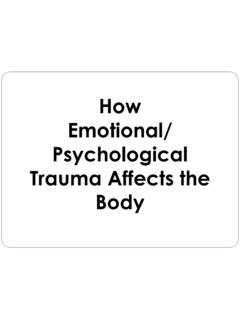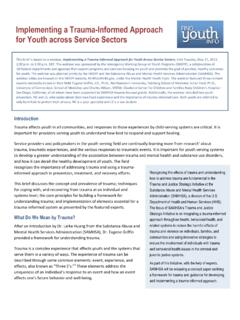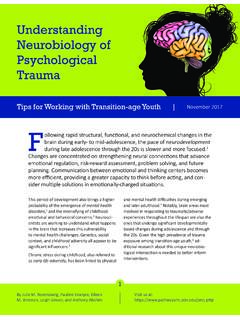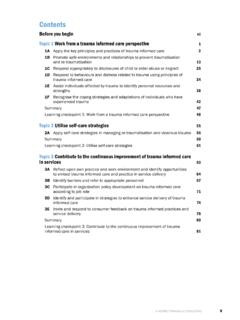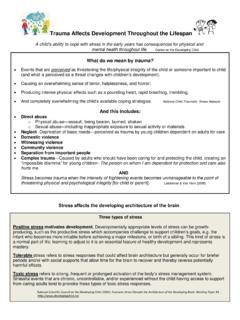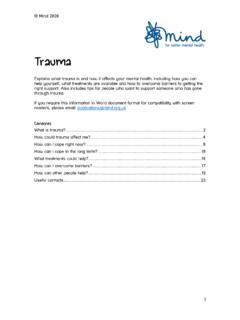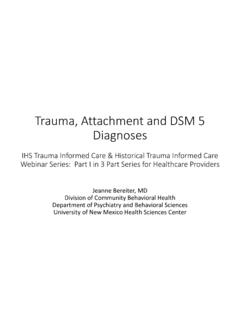Transcription of ESSENTIAL SKILLS AND COMPETENCIES IN WORKING WITH …
1 ESSENTIAL SKILLS AND COMPETENCIES IN WORKING WITH trauma WASHINGTON STATE MENTAL HEALTH CO-OCCURRING DISORDERS CONFERENCE Christine A. Courtois, PhD, ABPP Psychologist, Independent Practice (retired) Consultant & Trainer, trauma Psychology ice, d Washington, DC (retire, Independent Practice, Washington, DC (retired) Consultant and Trainer, trauma Psychology and Treatment trauma and Symptomatic Survivors Have Been Stigmatized We Like Heroes, We Don t Like Victims Victims Are Losers The Abuse Excuse In keeping with societal ignorance and denial, medical, mental health, social service, and criminal justice professionals have not known about or acknowledged the role of trauma in their client s difficulties They came by this honestly.)
2 The history of traumatic stress studies is one of episodic dissociation (Herman) little or no training in professional curricula, even today May also be due to personal reactions of denial/dismissal/disbelief/contempt/ hostility/judgment/parallel process The Problem trauma survivors have been further harmed by the very people who were charged with helping them Misunderstanding, misdiagnosis and direct mistreatment Abuse in the worse cases Betrayal- trauma Institutional betrayal Revictimization Retraumatization Hopelessness Despair Self-fulfilling prophecy The Problem External obstacles at a societal level Coping mechanisms developed by survivors can lead to severe symptoms Challenges of Addressing trauma Adapted from Risking Connection, pp.
3 7-12 Interpersonal styles developed by survivors can interfere with developing the helping alliance Mistrust and shame The skepticism & fear many survivor clients have about the medical, mental health, social service, and criminal justice systems Personal and professional factors and response on the part of the therapist or other helper Challenges of Addressing trauma Problem: Lack of Training or Adequate Training About trauma and Its Impact in Most Professional Curricula 10/14/2018 Copyright, CACourtois, PhD, ABPP, 2018 7 Problem: The Majority of Mental Health Clients/Consumer Have Some Sort of trauma in Their Background 10/14/2018 Copyright, CACourtois, PhD, ABPP, 2018 8 Therefore: Major Disparity and Disconnect Between Training and On the Job Reality 10/14/2018 Copyright, CACourtois, PhD, ABPP, 2018 9 Who Pays?
4 We All Do Victim/Survivors Families/Loved Ones Communities Society Human Potential Acute Suffering Intergenerational & Historical Impact Economic Impact 10/14/2018 Copyright, CACourtois, PhD, ABPP, 2018 10 Untreated Effects of trauma Are A Public Health Problem of MAJOR Proportions 10/14/2018 Copyright, CACourtois, PhD, ABPP, 2018 11 Treatment Themes and Components The significance of relationship, support, and understanding/acceptance trauma -referenced trauma -informed It s not you, it s what happened to you. Betrayal- trauma and ambivalent attachment Relational trauma and attachment style Relational treatment for relational injury.
5 Respect, empathy, curiosity about the client Reliability, consistency, transparency, management of response/CT/VT Copyright, CACourtois, PhD, ABPP, 2018 12 10/14/2018 Treatment Themes and Components Strength-based Problem-oriented Safety first Psych-education Emotion regulation training Identification of triggering events and experiences Countering dissociation and encouraging association Copyright, CACourtois, PhD, ABPP, 2018 13 10/14/2018 Treatment Themes and Components Exposure vs. avoidance Titrated Window of tolerance/therapeutic window Processing within relationship Cognitive processing Identity issues Attachment safety.
6 Attunement, mirroring and supporting self-development Challenging devaluation/shame Copyright, CACourtois, PhD, ABPP, 2018 14 10/14/2018 Treatment Themes and Components Family therapy Other caregivers School Cultural issues and supports Community supports Abstinence and recovery Advocacy and support groups and resources The significance of peer support and groups Copyright, CACourtois, PhD, ABPP, 2018 15 10/14/2018 The Need for trauma -Informed Care and What It Is Often stigmatize the traumatized for their symptoms and interaction styles Often misdiagnose and then mistreat (and medicate) the client s condition, at times making it much worst At worst, directly abuse and retraumatize the client Assume the treater is the expert and should have authority: non collaborative and not strength-based; hierarchical and top-down Expect the treater to be invulnerable.
7 View emotional response to the work as unprofessional & weak rather than a condition of the work Traditional/Medical Models of Care Emphasize control over collaboration Reflect a belief in a mind/body split Hold a disease perspective: Focus on symptoms to be cured Have largely been ignorant of trauma Do not know or assume that trauma has anything to do with the client s symptoms Traditional Models of Care Adapted from Risking Connection, pp. xiii-xiv Medical services are the usual entry point into the system Without assessment of trauma or knowledge of its possible impact and connection, diagnoses may be missed and unnecessary treatment or medication utilized Financial and economic costs and burdens Individual, family, community, society Traditional Models of Care trauma -informed services are those that incorporate an understanding of the impact of violence and psychological trauma in the lives of consumers of mental health, healthcare, and social services.
8 (Clark, Classen, Fourt, & Shetty, 2015) trauma -Informed Care Focuses on the strong possibility (or even the likelihood) of trauma in the mental health and medical client s background and as highly pertinent to the client s distress and symptoms Directly acknowledges and is sensitive to trauma -related issues trauma -Informed Care Major paradigm shift in view of clients and their symptoms/injuries Views symptoms as coping attempts, SKILLS , and adaptations to injury and not as disorders A much less pathologizing way of viewing symptoms A much more open and understanding perspective trauma -Informed Care Adapted from Risking Connection, pp.
9 Xiii-xiv What happened to you versus what s wrong with you? (Bloom) It s not you, it s what happened to you (Courtois) trauma -Informed Care Makes the connection: Germ theory of trauma (Bloom) We have a major pathogen in our midst TIC offered as a universal precaution Applies to all clients and services Across all levels of the organization Basis of good professional practice in general but Especially important for those who have been traumatized trauma -Informed Care First, Do No More Harm Guiding Principle of TIC Core Principles of TIC Awareness: Everyone knows the role of trauma Safety.
10 Ensuring physical and emotional safety Trustworthiness: Maximizing trustworthiness, making tasks clear, and maintaining clear and appropriate boundaries Choice: Respect and prioritize consumer choice and control Collaboration: Maximizing collaboration and sharing of power with consumers Empowerment: Prioritizing consumer empowerment and skill-building; motivation enhancement Many symptoms are misguided attempts to regulate emotions What once worked may stop WORKING and become a problem in its own right Symptoms and problems are often secondary elaborations of the untreated original effects of the trauma The relational impact of trauma often affects the helping relationship Some Major Assumptions of TIC A shared trauma perspective fosters collaboration A treater offers.
